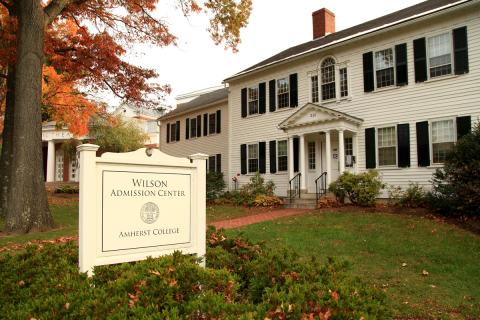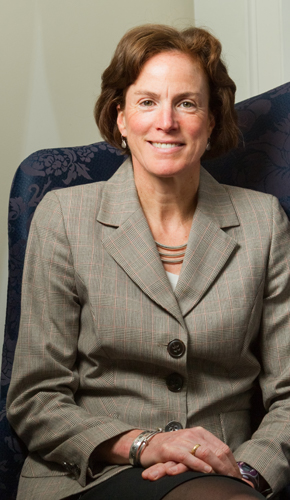
Dean of Admission Katie Fretwell ’81
The legendary, indefatigable Katie Fretwell ’81 has never coasted on anything, but she sure likes to offer you coasters. This Dean of Admission gives guests five choices. When I arrived at her office with my travel mug of tea, I slid them around like a three-card Monte game. The Amherst coaster felt too obvious, while that one with grinning trolls felt too unnerving. (It’s a gift from Tom Parker, her predecessor, from a trip to the United World College in Norway). I went, early decision, for the old black-and-silver number stamped “Nichols School.”
That’s Fretwell’s high school alma mater. Maybe it completes the circle: After all, Admission is the irreplaceable hinge between high school and college. And so our conversation coasted here and there, from how it felt to be a small part of Amherst’s second coeducational class, to how it felt to play a big part in the groundbreaking changes in Admission across her 30 years here. You can gain admittance to the rest of our talk now:
Whittemore: What do you remember about your own college admission process when you were in high school?
Fretwell: Well there you are, Kathy, using my high school coaster, quite ironically. Nichols was a small private high school, and I knew I would continue my education. That was a certainty in my family. My dad was a college president. I was the youngest of four. I grew up in a home where education was what it was all about. For college, I wanted to replicate some of the intimacy of a small learning environment.
The irony is that the way I went about it is exactly not how I advise young people today: I began by ruling out all the colleges where my siblings went. Several of those schools would have been great matches for me. But because my sister went to Smith, I felt comfortable looking at Amherst. I visited and was smitten—right away.
Whittemore: What college was your father president of?
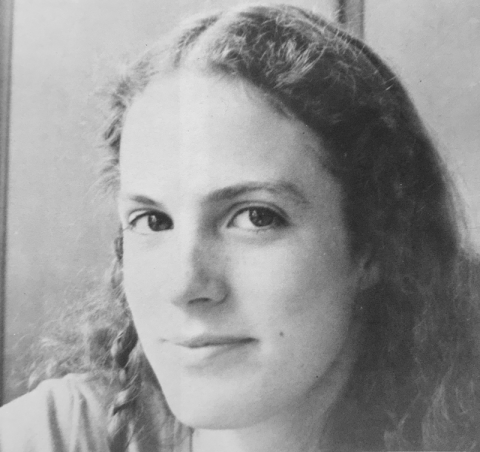
Katie Fretwell in her 1981 yearbook photo.

Katie Fretwell (right) in 1981.
Fretwell: Buffalo State College. He’d been a high school teacher and then an administrator in higher education, mostly in the SUNY system, did his dissertation on community colleges. Beyond raising us, my mom had three careers: opera singer, then college president’s spouse (a full-time job at the time!), then a psychologist.
Whittemore: Can I draw a line between your father’s interest in community colleges and your own move towards community-college student recruiting at Amherst?
Fretwell: No, because when I came to Amherst, I was unfamiliar with the concept of community colleges. It was through my work here that I became sensitive to the absolute and critical role that they play in educating the United States of America and how they fit into the incredible diversity of higher education in our country.
Whittemore: What were you like as a high school student?
Fretwell: I was a pretty good scholar, but I think I was a pretty great kid, and my school supported my individual development. I was a three-sport varsity athlete in high school: volleyball, soccer, lacrosse. I was very involved in theater and outing club. Those things propelled me forward. I ended up applying to Amherst early decision.
Whittemore: Had you visited other schools and Amherst rose to the top?
Fretwell: I probably visited 10 to 15, mostly small liberal arts colleges in the northeast. Amherst was my first trip. I got on a bus from Buffalo with a friend. We visited all five colleges in the area. Stayed in a hotel. It was very exciting. It was in the summer, and I remember the Amherst tour guide. I appreciated the range of things that he was able to talk about, and to this day, when we bring in a new cohort of tour guides, I say ‘Do you remember your tour guide at Amherst? And do you remember that person because he or she was good or bad?’ Because I think people do remember.
Whittemore: OK, you get in early decision. You arrive at Amherst in 1977. Were you tuned in to the fact that it was the early coed era, or not so much?
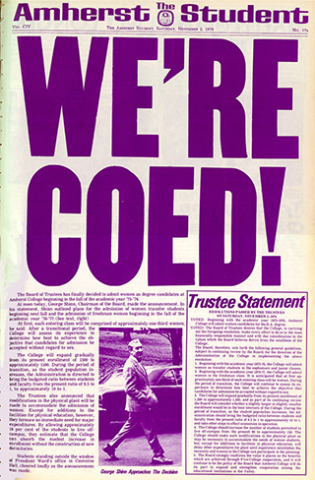
On November 2, 1974, the Trustees of Amherst
College voted in favor of coeducation.
Fretwell: I knew Amherst was still in the early stages of becoming coeducational. But that was neither a deterrent nor a lure for me. Interestingly, Nichols became coeducational when I began in ninth grade, having been an all-male high school. My middle school had also recently become coeducational, having been all-male. So this wasn’t a big deal for me. But it was an interesting time at Amherst. My class came in enthusiastically as the second coed class to arrive on campus. But the juniors and seniors had chosen Amherst as an all-male institution.
Whittemore: Were there moments when you really felt like an outlier?
Fretwell: I think of a moment when I was at a party, and I meet a guy, and he goes, ‘So do you go to Smith or Mount Holyoke?’ The fact that he didn’t consider that I could possibly be an Amherst student bothered me. Back then, it was an irritant that there were urinals in the women’s bathroom still. At the gym, the equipment room didn’t issue bras to the women, and there was no gynecologist in health services. And we didn’t have a history. Every time a woman did something for the first time, it was this monumental moment. Whether it was chair of the student newspaper or president of the student body, it was a first.
Whittemore: What did you major in?
Fretwell: I was a double major in English and theater, then called dramatic arts, and was involved in eight or nine shows, onstage and backstage. I was also a course or two short of a geology major. But in my application to Amherst, I indicated I wanted to be an architect. I had no experience whatsoever as an architect, but I suppose we can look to my career in admission as having something to do with architecture.
Whittemore: You’re building a class.
Fretwell: Exactly.
Whittemore: Let’s move on to post-college. How did you end up being in admissions as a career?
Fretwell: I challenge you, Kathy, to find anyone who you ask that question to say anything other than, “It was an accident.” It is an accidental career. You won’t find “admission officer” on any of those career-pondering checklists.
Whittemore: But so many futures depend on the admission process!
Fretwell: I think few people going through the process of applying to college think “I want to do that for a career,” because it can be very stressful. But I worked in this very admission office as a green dean. At that point, I was hoping to do work in secondary school education as a teacher, coach, administrator. And I thought, wow, what a great way to learn about different secondary schools across the country. I’ll be traveling. I’ll be reading applications from different schools. And that will help me identify what kind of school setting I want to work in.
Which indeed, it allowed me to do. But as I was doing this work, I loved it. I loved meeting and talking with young people about their future and aspirations and joys. It’s a very positive thing. And it’s fun.
Whittemore: It sounds inspiring.
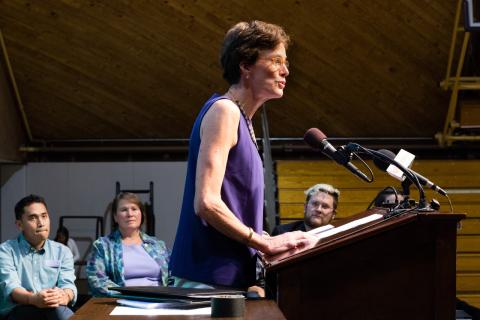
Katie Fretwell welcomes incoming students at Orientation 2017. Photo by Maria Stenzel.
Fretwell: It was inspiring, humbling, still to this day. And I thought, huh, maybe I stick with this. In fact, my next job was working at a secondary school, teaching and coaching and being a college counselor at the Brooks School. It’s a small independent boarding school outside of Boston.
I moved from the receiving end to the shipping end of the process of working with students in transition to college. I did that for two years and then went to graduate school and got an administrative degree. I decided to make admission work a commitment. Then, perhaps surprisingly, I found myself applying for a job at Williams where, perhaps surprisingly, I was hired. I might have been the first Amherst graduate to work in the Williams College admission office.
Whittemore: Katie, where’d you get your master’s?
Fretwell: Harvard University. It is in Cambridge, Massachusetts.
Whittemore: Yes, I’ve heard of it.
Fretwell: Yes, H-A-R-V ...
Whittemore: Hah! OK, I want to zero back to what you said about it being humbling, this job. Why is it humbling?
Fretwell: Because when you are exposed to 17- and 18-year-olds from across the country and around the world, who aspire to an Amherst education, they are bright and ambitious people who, because of their curiosity, their passions, have pursued fascinating paths, and made things happen, whether it’s by leading others or creating things, or overcoming things in order to reach those goals. It is absolutely fascinating to see what challenges students have been able to overcome to be successful. And that is humbling.
Whittemore: Let’s move onto recruiting trips. Did you have particular areas you went to?
Fretwell: On one long plane trip, I looked in the back of the airline magazine where they have the map where the flights go. I wondered how many states I’ve actually been in, and I marked them off. I think I’ve been in 39 states on behalf of college admission, and probably seven or eight countries. I went to Singapore, China, Korea, Japan, Thailand, Hong Kong and more.
Whittemore: What would you call one of your biggest highlights during your tenure here?
Fretwell: No doubt, Amherst being named as recipient of the Jack Kent Cooke Prize for Equity in Educational Excellence in 2016. I am so proud of the recognition Amherst received for its commitment to identifying, attracting, enrolling and supporting talented low-income students. I am exceedingly proud of the College’s collaboration across departments, and the financial support the board has lent to this effort. We are a stronger institution for this work, and the prize put a spotlight on Amherst’s ambition and success.
